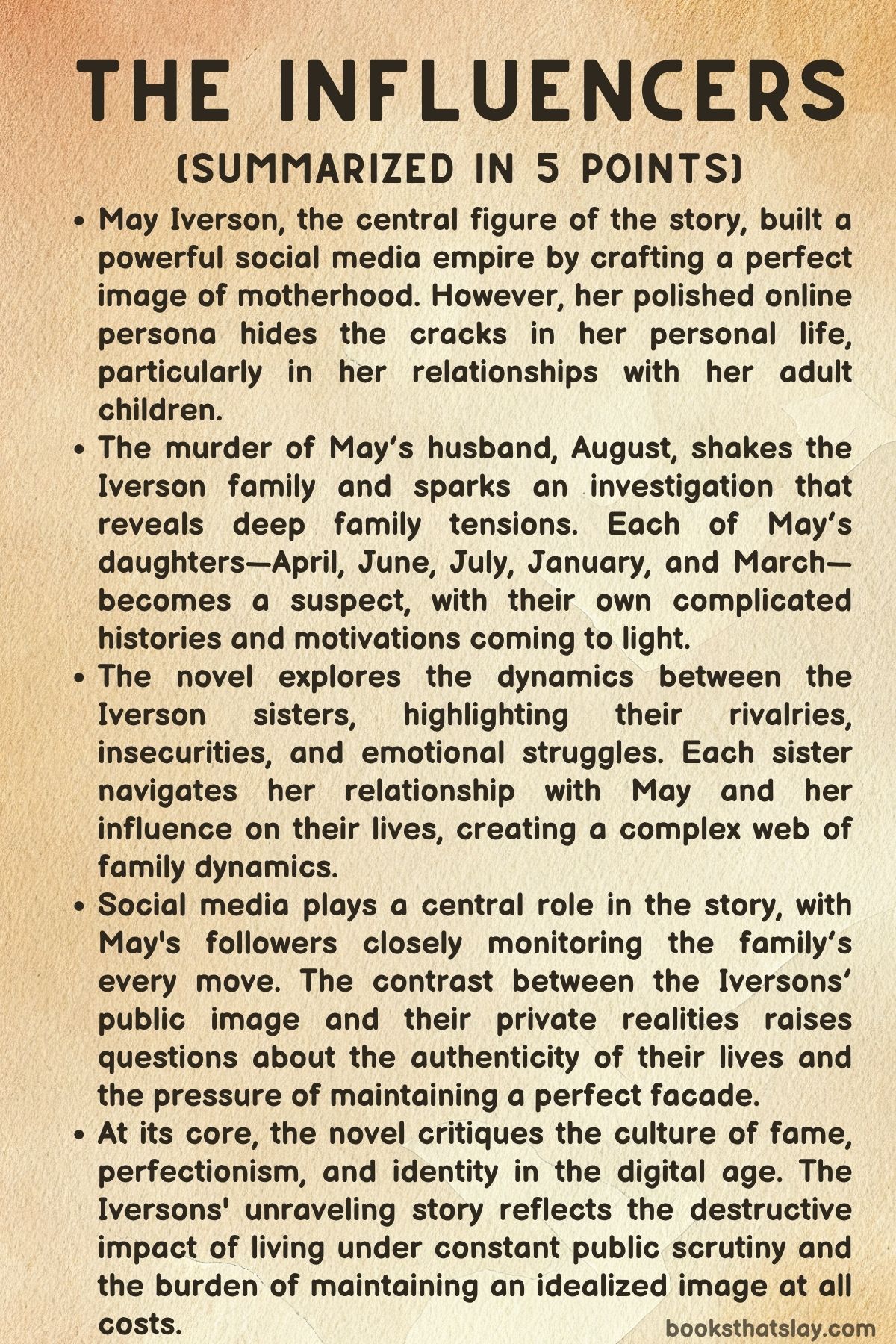The Influencers Summary, Characters and Themes
The Influencers by Anna-Marie McLemore is a compelling exploration of the impact of social media on family dynamics, fame, and personal identity. Set against the backdrop of a family dealing with a high-profile tragedy, the novel follows the lives of May Iverson and her daughters as they navigate the aftermath of her husband August’s murder.
May, a social media influencer, built her brand around a perfect family life, which begins to crumble as secrets, rivalry, and the dark side of fame unfold. The story tackles themes of image manipulation, personal struggles, and the complex relationships between family members.
Summary
The story revolves around May Iverson, a well-known social media influencer who has built an empire around her “Mother May I” brand, promoting the idealized image of motherhood, beauty, and family life. May’s image, carefully curated over the years, hides the cracks in her personal life.
Behind the perfection, May’s children are grown adults with their own complicated relationships with her and each other. Her brand, which initially resonated with audiences for its relatability, begins to clash with the reality of her family’s dynamics.
May’s life takes a dark turn when her husband, August Ingraham, is murdered. The sudden tragedy throws the Iverson family into chaos, and the investigation into August’s death brings up old tensions and hidden secrets.
The Iverson daughters—April, June, July, January, and March—become key figures in the investigation, with each one carrying their own burdens, secrets, and resentments. The murder mystery is further complicated by the public nature of their lives and the scrutiny they face as social media stars.
The daughters’ relationships with May are complex. April, the oldest, feels distanced from her mother, particularly after a failed business venture involving the family name.
She is outspoken about her frustrations with May, especially concerning the way she handled the family’s finances and her public persona. April’s relationship with May has always been strained, and after August’s death, their interactions only grow more tense.
June and July, the twins, are glamorous and visible in the public eye. June, known for her emotional detachment, enjoys the attention and is skilled at manipulating situations to her advantage.
Her involvement in leaking videos and curating public images for the family is one of the key tensions in the novel. July, on the other hand, is more concerned with maintaining normalcy, but she, too, hides her own insecurities and struggles.
Despite their contrasting personalities, both sisters are wrapped up in the web of suspicion surrounding August’s murder.
January, the quieter, more reserved daughter, is initially seen as aloof and disconnected from her mother. She becomes a central figure in the investigation as the detectives question her about her relationship with May and the events surrounding the murder.
Her calm demeanor raises suspicions, but her involvement in the family’s drama remains unclear.
As the investigation deepens, other family members and employees of the Iversons come under suspicion. Ernesto, May’s ex-husband, and Luke Sweatshirt, a man associated with the Iverson twins, are investigated, but the focus remains on the Iverson daughters.
Luke’s connection to the family becomes a point of intrigue as his involvement with the twins and the circumstances of August’s death come into question. His life becomes chaotic as the media and public scrutinize him, casting doubts on his character and motives.
The investigation itself is a catalyst for exploring deeper family tensions and the Iversons’ public personas. May’s need to maintain control over the narrative and her image is evident throughout the investigation.
She continues to use her social media platform to protect her brand, even as the cracks in her family life become more visible. May’s calculated responses to the murder and her efforts to maintain her image as the perfect mother and wife are in direct contrast to the turmoil within her family.
Throughout the novel, the themes of public image versus private reality are explored. The Iversons’ lives, once seen as perfect and aspirational, begin to unravel as their secrets come to light.
The daughters’ personal struggles, their relationships with May, and their own complex identities are brought into the open. Each daughter struggles with the weight of being part of a family that is constantly in the public eye.
They grapple with their roles in the family and the expectations that come with being part of the Iverson brand.
As the plot progresses, the true nature of the Iversons’ relationships is revealed. The family dynamic is fraught with competition, jealousy, and unresolved emotions.
April feels alienated from her sisters, while June and July struggle with the pressure of maintaining their glamorous public personas. The family’s reputation, once untouchable, begins to crumble under the weight of their secrets and lies.
The public’s perception of the Iversons, particularly May, becomes increasingly polarized. While some admire May for her seemingly perfect life, others begin to see the cracks in her carefully constructed persona.
The murder investigation forces the Iverson family to confront the realities of their lives and the facade they’ve built for the world. Each sister, in her own way, must come to terms with her role in the family’s downfall and the impact of their public lives on their personal identities.
In the end, the story is not just about the murder of August Ingraham but about the larger questions of family loyalty, identity, and the price of fame. The Iversons are a family whose lives have been shaped by the need to maintain a perfect image, but the truth about their relationships and struggles can no longer be hidden.
As May’s carefully crafted persona begins to unravel, the Iverson daughters are left to navigate the consequences of their actions and the deep-seated emotional scars that have been exposed.
The novel critiques the illusion of perfection in the age of social media and the toll it takes on those who live under the scrutiny of public opinion. It explores the complexities of identity, the pressures of fame, and the fragility of family bonds.
Ultimately, The Influencers paints a portrait of a family torn apart by the very image they worked so hard to create, offering a sobering reflection on the cost of living for an audience rather than for oneself.

Characters
May Iverson
May Iverson, the central figure of the novel, is a glamorous social media influencer who built her empire under the brand “Mother May I.” For nearly twenty-five years, she curated an image of perfect motherhood, beauty, and domestic bliss, gaining immense popularity online.
Her life, however, is a carefully constructed illusion, as the cracks in her seemingly flawless persona begin to show with time. May’s superficiality and the use of cosmetic surgery to maintain a youthful appearance lead to a growing disconnect between her public image and her real life.
Her children, now adults, become more independent, making it harder for her to continue portraying the idealized family dynamic she once championed. Despite the growing awareness of her inauthenticity, May remains influential, maintaining control over the narrative of her life through her social media platforms, even as her marriage to August Ingraham collapses and her family faces deep internal tensions.
Throughout the story, May’s manipulation of her image, her family’s lives, and the public’s perception underscores the theme of the destruction caused by the pursuit of perfection in a world driven by social media.
January Iverson
January Iverson, the most introverted of the Iverson sisters, maintains a somewhat distant relationship with her mother. Described as “cordial but distant,” January’s emotional detachment makes her an intriguing character.
Though she is calm and collected during the police investigation into her stepfather August’s murder, her aloofness and cold demeanor raise suspicions about her involvement. January keeps her thoughts to herself, especially when interrogated about her mother’s role in the murder, choosing to follow her sister April’s advice and maintain composure.
Her strained relationship with May and her inability to connect emotionally with her family make her a figure of mystery, with her past and her own secrets adding complexity to the investigation. January’s quiet resilience is overshadowed by the chaotic public scrutiny of her family, and her place in the Iverson family dynamics is one of isolation and unspoken pain.
April Iverson
April Iverson, the eldest daughter of May, is outspoken and confrontational. She has been at odds with her mother for years, especially after a failed business venture involving the Iverson name.
Her dissatisfaction with May’s treatment of their family’s finances and her mother’s influence on their lives make her a vocal critic of the family dynamic. Unlike her sisters, April is unafraid to express her frustrations, even in the face of public scrutiny.
She openly challenges May’s behavior, particularly after a video emerges showing May’s callous comments regarding August’s death. April’s complex relationship with social media is revealed when she condemns the role influencers like Ashley Morgan Kelly play in shaping the public narrative.
As the investigation into August’s murder intensifies, April grapples with her role in the family’s unraveling, torn between loyalty to her family and the desire to expose the truth.
June Iverson
June Iverson is portrayed as someone who thrives on attention, skillfully manipulating situations to serve her own interests. She is highly involved in the family’s public image, even filming moments in secret to control the narrative.
June’s emotional detachment and desire to maintain the spotlight lead her to exploit family events for her own gain. She is particularly adept at manipulating the media and public perception, creating chaos to heighten her visibility.
June’s involvement in the release of incriminating videos about her family suggests that she is not above using her influence to shift public opinion, even at the expense of her family’s reputation. Despite her glamorous appearance and public persona, June’s actions reveal a deeper desire for power and control, as well as a profound dissatisfaction with her life behind the scenes.
July Iverson
July Iverson, often seen as the gentler twin, is revealed to have a much darker side as the story progresses. Her initial image as the quiet, reserved sister gives way to the realization that she, too, is deeply affected by the family’s dysfunction.
July’s frustration with May’s manipulation of their lives grows as she reflects on the emotional toll of being a part of the Iverson brand. Her involvement in setting a destructive chain of events in motion, including the fire that leads to May’s breakdown, marks a turning point in her character arc.
The revelation of her aggressive behavior, particularly through the release of uncut footage, shifts the public perception of July, showing her to be just as ruthless as her sisters. Despite her earlier image as the gentler twin, July’s growing resentment and emotional volatility make her a complex character caught between wanting to escape her mother’s control and being entangled in the consequences of her actions.
Luke Sweatshirt
Luke Sweatshirt’s character is introduced as a figure shrouded in mystery, and his connection to the Iverson family only deepens the intrigue. Initially associated with the Iverson twins, June and July, Luke’s murky background makes him a subject of suspicion, especially after August’s death.
He becomes a focal point of the investigation, with his possible involvement in the murder being speculated, though the truth remains unclear. His life becomes increasingly chaotic as he faces accusations and the media frenzy surrounding the Iverson family.
Luke’s narrative explores the damaging effects of public gossip and false accusations, as his connection to the family subjects him to unwarranted scrutiny. Throughout the novel, Luke remains an enigmatic figure, and his role in the family’s downfall, while ambiguous, adds an additional layer of tension to the story.
Ernesto
Ernesto, May’s ex-husband and the father of her children, is a passive figure in the narrative but one who contributes to the unraveling of the Iverson family. His seemingly vulnerable moment in a photo with Luke Sweatshirt raises questions about his intentions and his role in the family’s drama.
Despite the tension, Ernesto’s fear and the public’s interpretation of the photo only serve to reinforce his image as a passive character, unable or unwilling to confront the deeper issues within his family. His quiet presence in the story contrasts with the louder, more confrontational Iverson daughters, making him a figure who, despite his significant role in the family’s history, remains largely on the periphery of the investigation and the media circus.
March Iverson (Marc Iniesta)
March Iverson, later known as Marc Iniesta, is another figure whose transformation is central to the narrative. March’s shift from his original identity to Marc reflects his struggle to carve out an individual identity separate from his mother’s empire.
Caught in the shadow of May Iverson’s brand, Marc’s journey is one of self-discovery and rebellion against the constraints of family expectations. His transformation highlights the personal toll that May’s control over her children’s lives has had, with Marc seeking to break free from the carefully curated public image that has defined his family.
His character represents the desire for autonomy and the challenges of living in a family whose every move is scrutinized and commodified by the public eye.
Themes
The Burden of Perfection
In The Influencers, May Iverson’s carefully curated public persona represents the pressure of maintaining an image of perfection at all costs. As an influencer with a massive following, May’s life is meticulously designed for the public eye, balancing beauty routines, family life, and relatable motherhood.
However, behind this polished image lies an undercurrent of inauthenticity, where May struggles to reconcile her personal life with the idealized version she projects. The perfectionism that May has cultivated over twenty-five years becomes a double-edged sword.
On one hand, it provides her with wealth, fame, and influence; on the other, it traps her in a cycle where nothing is ever enough, and every crack in her facade threatens to unravel everything. As her children grow older and her life becomes increasingly out of sync with the image she portrays, the perfection she once embodied begins to feel more and more unattainable.
May’s obsession with perfectionism ultimately creates a suffocating environment not only for her but also for her daughters, who must navigate the pressures of living in her shadow while dealing with their own identities. The tension between the facade of perfection and the reality of imperfection forms a core conflict within the narrative, illustrating how the pursuit of an idealized image can be both a source of power and a catalyst for destruction.
Family and Identity
The theme of family is central to The Influencers, particularly in how individual identities are shaped within the confines of a family dynamic dominated by May Iverson’s public persona. The Iverson sisters each struggle with the expectations placed upon them, both by their mother and by the public.
For the daughters, their relationships with May are complicated by years of manipulation and control, as May exploits her family’s image to build her social media empire. Each sister’s journey reveals the complexities of identity within a family that is constantly under public scrutiny.
April, the eldest daughter, for instance, has distanced herself from her mother’s brand due to years of personal and professional dissatisfaction. Meanwhile, January’s detached approach to family matters suggests a deeper internal struggle about her role within the Iverson family.
June and July, the twins, present contrasting approaches: June manipulates situations to maintain attention, while July grapples with resentment toward her mother, feeling forced to perform for the camera rather than living her truth. Through these various characters, the narrative explores the difficulty of carving out personal identity when one is constantly overshadowed by a larger-than-life family figure.
Ultimately, the Iversons’ story is a poignant commentary on how family relationships, often rooted in love, can be distorted by the pressures of fame, leaving each member with a fractured sense of self.
The Dangers of Public Persona vs. Private Reality
The Influencers explores the dangerous divide between public personas and private realities, particularly in how May Iverson’s social media presence influences not just her followers but also her family. May’s brand, “Mother May I,” projects an image of a perfect, loving mother who has everything under control, but the reality behind the scenes is much more complicated.
As the story unfolds, the contrast between May’s online presence and her personal struggles becomes increasingly evident. May’s obsession with controlling her public image leads her to manipulate her family’s lives for the sake of maintaining the illusion of perfection.
This creates a distorted reality in which her daughters are forced to perform roles that may not align with their true selves. The investigation into August’s murder brings this tension to the forefront, as the Iverson family’s private conflicts and dysfunctions are exposed to the public.
The role of social media in shaping public perception is a significant theme, highlighting the dangers of living under constant scrutiny and the impact it can have on one’s identity. The novel critiques the pervasive nature of social media, showing how it can blur the lines between truth and fabrication, ultimately leading to a loss of authenticity and a breakdown of personal connections.
The Impact of Fame on Mental Health
Fame in The Influencers is shown not just as a source of power and wealth but also as a burden that significantly impacts the mental health of the Iverson family, particularly May Iverson. May’s struggle to maintain her public persona requires constant upkeep, from cosmetic surgeries to carefully orchestrated social media posts, all of which take a toll on her emotional well-being.
The pressure of being “Mother May I” has left her isolated, unable to separate her true self from the image she has created. As the family’s private life begins to unravel following August’s murder, it becomes clear that the weight of public scrutiny has severely affected May’s ability to cope with tragedy.
Her reactions to the murder, focused on self-preservation rather than genuine grief, further highlight the psychological strain caused by living a life constantly under the public microscope. The novel also examines how this impact extends to her daughters, each of whom experiences the psychological toll of being part of a family where their every move is analyzed by millions.
April’s frustration with her mother’s manipulation of their lives, June’s detached manipulation of public perception, and July’s internalized resentment reflect the deep mental and emotional strain that comes with living in such a high-profile, heavily curated world. The exploration of fame’s psychological costs underscores the destructive consequences of living for an audience rather than for oneself, revealing the toll it can take on mental health and personal relationships.
The Illusion of Control and the Consequences of Secrets
One of the major themes in The Influencers is the illusion of control and the dangerous consequences of keeping secrets. Throughout the narrative, May Iverson works tirelessly to maintain control over her image, her family, and the narrative surrounding her life.
She manipulates her children, the media, and even her followers to maintain the appearance of perfection. However, the murder of her husband, August, shatters the illusion of control that May has so carefully constructed.
The Iverson family is forced to confront the secrets they have hidden for years, and as these truths surface, the consequences are devastating. May’s attempt to keep her family’s image intact in the face of the investigation reveals just how much of her life has been built on lies.
The more she tries to control the narrative, the more her grip slips, leading to a cascade of revelations that expose the cracks in her facade. Each family member harbors their own secrets, whether it is a personal grudge, an unresolved issue, or a betrayal that goes unnoticed.
The slow unraveling of these secrets not only puts the Iversons at odds with each other but also forces them to confront the realities of their lives, making it clear that the consequences of hidden truths are far more damaging than any external scandal. The theme of control versus chaos illustrates how the attempt to manage one’s image at all costs can backfire, resulting in the destruction of both personal relationships and public facades.


